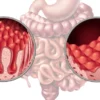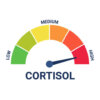
It’s common for IBS symptoms to flare up in sync with your menstrual cycle, pregnancy, or even stress. As hormones play a significant role in gut health, changes in the balance of these hormones can impact several areas of health, including the gut. For those living with irritable bowel syndrome (IBS), understanding this connection can be a key piece of the puzzle to symptoms and also treatment.
Hormones influence everything from digestion and pain sensitivity to levels of inflammation in the body. This means that fluctuations in hormonal levels, especially those related to sex hormones like oestrogen and progesterone, can trigger or worsen IBS symptoms. In this article, I’ll discuss the science behind this link and what you can do to manage hormone-related IBS symptoms.
How Hormones Impact IBS
Hormones are the chemical messengers that regulate and balance many bodily functions, including digestion. While everyone’s hormonal landscape is different, research consistently shows that hormonal imbalances or fluctuations can influence IBS symptoms in a number of ways.
Sex Hormones and the Gut
Oestrogen and progesterone are the primary female sex hormones. These don’t just affect the reproductive system but also interact directly with the gut. In fact, the gastrointestinal tract has hormone receptors that respond to these fluctuations.
Oestrogen tends to slow down gut motility, which can lead to constipation-predominant IBS (IBS-C) during certain times of the menstrual cycle as well as menopause. On the other hand, progesterone may relax smooth muscle in the digestive tract, potentially contributing to bloating and discomfort. These effects help explain why women are more than twice as likely as men to suffer from IBS.
Male sex hormones also influence gut health, with testosterone, the primary male sex hormone, having its own gut-gene interactions. While less studied, lower testosterone levels have been linked to increased gut permeability (leaky gut) and inflammatory responses, both of which may exacerbate or contribute to IBS developing.
Hormonal Influence on Digestion and Pain Sensitivity
The gut-brain axis is highly sensitive to hormones. When hormonal levels shift, they can impact gut motility, sensitivity, and even the microbial balance in the small and large intestine. This partly explains why IBS symptoms often coincide with hormonal changes.
Some hormones, like the stress hormone cortisol, can ramp up inflammation and make the gut more sensitive to pain. Oestrogen may also amplify visceral hypersensitivity, which is when your gut becomes overly responsive to normal stimuli like gas or stretching. If you have IBS, this can mean more cramping, bloating, or changes in bowel habits during hormonal changes.
Inflammation and IBS Symptoms
Although IBS is not classified as an inflammatory disease in the same way as IBD (Inflammatory Bowel Disease), low-grade inflammation is often present. Hormonal imbalances can affect this, with both oestrogen and cortisol playing key roles.
Chronic stress, for instance, raises cortisol levels, which may increase gut inflammation and permeability (“leaky gut”), worsening IBS symptoms. Conversely, oestrogen has anti-inflammatory effects, but in fluctuating levels, it may also contribute to the unpredictable nature of IBS symptoms, especially around menstruation, pregnancy, or menopause.
Hormonal Fluctuations and IBS
As discussed, hormones can have a wide range of impacts on gut function. Specific life stages and hormonal events influence IBS symptoms.
Menstrual Cycle and IBS
It’s common for women to report that IBS symptoms change at different points in their cycle, and there’s science to back this up. During the luteal phase (the week or so before the period), progesterone and oestrogen levels drop, which can slow digestion and lead to bloating or constipation.
Once menstruation begins, prostaglandins (hormone-like substances involved in pain and inflammation) rise. These can increase uterine contractions and also impact gut motility, often causing diarrhoea and cramping. In fact, for some, the first few days of a period can mimic or exacerbate IBS-D (diarrhoea-predominant IBS).
Pregnancy and IBS
Pregnancy comes with a surge of hormonal changes, especially in oestrogen and progesterone levels. For some, IBS symptoms improve during pregnancy, potentially due to slowed gut motility and increased blood flow to the digestive system. For others, the same changes can make IBS worse, especially in the first trimester when nausea, constipation, and bloating are common.
Later in pregnancy, the growing uterus can put physical pressure on the intestines, compounding the effects of hormonal changes.
There is also the emotional and psychological stress of pregnancy, which can influence the gut-brain axis and further complicate symptoms.
Menopause and IBS
Menopause marks the end of menstruation and a significant drop in oestrogen and progesterone. Many women notice changes in their IBS symptoms during this time. For some, symptoms improve, possibly due to more stable hormonal levels. For others, especially those with a history of hormonal sensitivity, symptoms may worsen.
Lower oestrogen levels post-menopause can affect gut microbiota diversity and increase inflammation, potentially exacerbating IBS symptoms. Hot flashes, sleep disturbances, and mood changes associated with menopause can also add to digestive stress.
Birth Control and IBS
Hormonal birth control, whether it’s the pill, patch, injection, or IUD, can influence IBS symptoms. Because these methods alter your body’s natural hormone cycle, they can have both positive and negative effects on gut health.
Some women find relief from hormonal fluctuations when taking birth control, which can stabilise IBS symptoms. Others may experience new or worsened symptoms, especially with progestin-only methods. It’s very individual and often comes down to how sensitive your gut is to hormonal changes.
Managing Hormonal Effects on IBS
Understanding that hormones can affect your IBS is one thing; knowing what to do about it is another. The good news is that there are several strategies that can help you manage symptoms effectively.
Diet and Lifestyle Adjustments
Diet plays a huge role in managing IBS, and when hormones are involved, it’s even more important to stay consistent with supportive nutrition. A low FODMAP diet is often the first port of call, as it reduces fermentable carbohydrates that can contribute to bloating and discomfort.
Other hormone-balancing foods include:
· Cruciferous vegetables like broccoli and kale (rich in DIM, a compound that helps metabolise oestrogen)
· Omega-3 fatty acids from fatty fish or flaxseeds (anti-inflammatory)
· Complex carbs and fibre to stabilise blood sugar and support digestion
Stress management is equally important. Since cortisol can wreak havoc on both hormones and digestion, practices like yoga, mindfulness, and regular exercise can reduce stress and stabilise the gut-brain axis.
Sleep hygiene also deserves a mention. Poor sleep disrupts hormonal balance and can exacerbate IBS symptoms, so aiming for 7–9 hours per night is essential.
Medical Treatments and Therapies
If diet and lifestyle changes aren’t enough, it might be time to explore medical options. Hormone therapy, including bioidentical hormones or hormone replacement therapy (HRT), may help some women during menopause, but these should always be discussed with a healthcare provider, especially if you have IBS or other health concerns.
For more persistent or severe IBS symptoms, medications like antispasmodics, gut-directed antibiotics (such as rifaximin for SIBO), or even low-dose antidepressants may help. When hormone-related IBS is suspected, working with a practitioner who understands both digestive and endocrine health is crucial.
Therapies like cognitive behavioural therapy (CBT) and gut-directed hypnotherapy have also shown promise in reducing IBS symptoms by calming the gut-brain axis and improving emotional resilience.
Conclusion
Hormones have a powerful influence on how our digestive system behaves, and for those with IBS, this connection can be both a challenge and a clue toward better management and treatment. From the ups and downs of the menstrual cycle to the various phases of pregnancy and menopause, our hormonal landscape is constantly changing, and so too can the symptoms of IBS.
Recognising how the body responds to these changes can help you make more informed decisions about your diet, stress levels, and treatment options. Whether you’re exploring nutritional tweaks, medical therapies, or lifestyle changes, know that support is available, and you don’t have to navigate hormone-related IBS alone.
If you suspect that your hormones might be playing a role in your IBS journey, consider tracking your symptoms alongside your cycle, speaking to a specialist, and taking steps to support both your gut and hormonal health.






